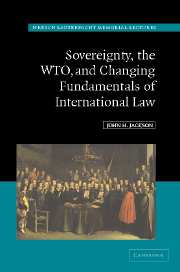Book contents
- Frontmatter
- Contents
- Preface
- Table of statutes and regulations
- Table of cases
- Part I Challenges to fundamental assumptions of international law
- 1 Introduction: international law and international economic law in the interdependent world of the twenty-first century
- 2 The real world impinges on international law: exploring the challenges to the fundamental assumptions of international law and institutions
- 3 Sovereignty-modern: a new approach to an outdated concept
- Part II The WTO
- Part III The search for solutions
- Appendix: Outline of the Uruguay Round treaty establishing the World Trade Organization
- Notes
- Index
3 - Sovereignty-modern: a new approach to an outdated concept
Published online by Cambridge University Press: 29 March 2011
- Frontmatter
- Contents
- Preface
- Table of statutes and regulations
- Table of cases
- Part I Challenges to fundamental assumptions of international law
- 1 Introduction: international law and international economic law in the interdependent world of the twenty-first century
- 2 The real world impinges on international law: exploring the challenges to the fundamental assumptions of international law and institutions
- 3 Sovereignty-modern: a new approach to an outdated concept
- Part II The WTO
- Part III The search for solutions
- Appendix: Outline of the Uruguay Round treaty establishing the World Trade Organization
- Notes
- Index
Summary
However, for all the reasons mentioned already, the conditions under which sovereignty is exercised – and intervention is practised – have changed dramatically since 1945. Many new states have emerged and are still in the process of consolidating their identity. Evolving international law has set many constraints on what states can do, and not only in the realm of human rights. The emerging concept of human security has created additional demands and expectations in relation to the way states treat their own people. And many new actors are playing international roles previously more or less the exclusive preserve of the states.
International Commission on Intervention and State Sovereignty, 2001Sovereignty and the fundamental logic of international law
Chapter 2 explored a number of puzzles and problems about international law and international economic law. Often related, indeed, axiomatically connected to these problems is the concept of “sovereignty,” which, however, has many different meanings and implications.
Although much criticized, the concept of “sovereignty” is still very central to almost all thinking about international relations and particularly international law. The old “Westphalian” concept in the context of a nation-state's “right” to monopolize certain exercises of power with respect to its territory and citizens is in many ways discredited (as discussed below), but its main characteristics are still prized and harbored by those who maintain certain views, perhaps fairly characterized “realist,” or who otherwise wish to avoid (sometimes with justification) interference in a national government's decisions and activities by foreign or international powers and authorities.
- Type
- Chapter
- Information
- Publisher: Cambridge University PressPrint publication year: 2006



